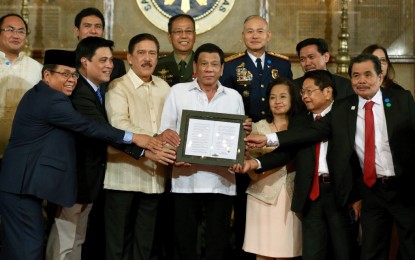
BANGSAMORO ORGANIC LAW. President Rodrigo Roa Duterte poses for a photo with the legislators and negotiators in the peace process with the Moro Islamic Liberation Front (MILF), as well as top officials from the Armed Forces of the Philippines and Philippine National Police during the presentation of the Bangsamoro Organic Law (BOL) to the MILF at Malacañan Palace on August 6, 2018. The signing of BOL or Organic Law for the Bangsamoro Autonomous Region in Muslim Mindanao (OLBARMM) is one of most notable accomplishments of the Duterte administration in the road to achieving long-lasting peace in Mindanao. (Presidential Photo)
MANILA — President Rodrigo Duterte has repeatedly expressed hope to see the promise of Mindanao fulfilled, or at the very least, approaching fulfillment before the end of his term in 2022. Since then, his administration has taken great strides towards doing exactly that.
Perhaps the most notable accomplishment in the road to achieving long-lasting peace in Mindanao is the signing of the Organic Law for the Bangsamoro Autonomous Region in Muslim Mindanao (OLBARMM) or Republic Act 11054 on July 26, 2018 just three days after he delivered his third State of the Nation Address (SONA).
Duterte was expected to sign the OLBARMM, often called the Bangsamoro Organic Law (BOL), during his 2018 address but it was stalled after the House of Representatives failed to ratify the BOL due to an unexpected change of leadership in the House of Representatives.
The BOL seeks to establish a new Bangsamoro political entity to replace the Autonomous Region in Muslim Mindanao (ARMM) and achieve national reconciliation with the Moro rebel groups.
This law, a result of peace talks, institutionalizes provisions of the Comprehensive Agreement on the Bangsamoro, the 2014 peace agreement signed by the government and the Moro Islamic Liberation Front (MILF).
After a two-part plebiscite on January 21 and February 6, 2019, the BOL was officially ratified and the new Bangsamoro region which covers the provinces of Basilan, Lanao del Sur, Maguindanao, Sulu, and Tawi-Tawi, the same provinces as the abolished ARMM.
On February 22, members of the group that will oversee the newly-formed Bangsamoro region, the Bangsamoro Transition Authority (BTA), took their oath before the President.
Currently, there are 76 BTA members, with 42 nominees of the MILF; 10 representatives from Moro National Liberation Front (MNLF), and 26 nominated by the government. The BTA is chaired led by its interim chief minister Al-Hajj Murad Ebrahim, MILF chairman.
Soon after the BTA members took oath, the BARMM was formally inaugurated at the Shariff Kabunsuan Cultural Complex in Cotabato City on March 29 which marks the transition period to the establishment of the Bangsamoro parliamentary government in 2022.
Duterte later signed Executive Order 79 on April 24, 2019 implementing the Annex on Normalization under the Comprehensive Agreement on the Bangsamoro, which provides for the creation of an Inter-Cabinet Cluster Mechanism on Normalization to prioritize, coordinate and mobilize government agencies in the implementation of aspects of the program covering security, socio-economic development, confidence-building measures, and transitional justice and reconciliation.
Ending armed conflict
Duterte’s promise to Mindanao does not stop there. Aware that the road to achieving long-lasting peace in Mindanao is “long and rough”, he is using all his power to spearhead efforts to end armed conflict with the remaining three years of his presidency.
On December 4, 2018, Duterte signed Executive Order 70 which institutionalizes the whole-of nation approach in attaining inclusive and sustainable peace by creating a national task force to end local communist armed conflict.
The task force prioritizes and harmonizes the delivery of basic services and social development packages in conflict-affected areas and vulnerable communities, facilitate societal inclusivity, and ensure active participation of all sectors in the pursuit of the country’s peace agenda.
Among the task force’s most notable duties is a shift from a military-centric towards a civilian-led approach in confronting the communist movement.
Duterte himself chairs the task force while National Security Adviser Hermogenes Esperon Jr. serves as his vice chair.
On July 16, Duterte urged the task force to work “doubly hard” in addressing the problems of insurgency so make people and communities feel safer and more secure.
In line with the creation of the task force, Duterte also formalized Cabinet Officers for Regional Development and Security (CORDS) initiative which spreads Cabinet officials nationwide and designates them per region “to help ending regional and local communists.”
The CORDS will also be able to help in delivering basic services and livelihood to different regions and ensure the “speedy, efficient and orderly resolution of problems in government operations in his/her assigned region.”
Survey and midterm election results continue to show that people appreciate the President’s accomplishments in Mindanao which are not taking a break anytime soon.
With only three years left until Duterte steps down, his commitment to make Mindanao peaceful and progressive is close to approaching fulfillment.
Duterte served as mayor of Davao City for over two decades before he became the country’s first leader from Mindanao in 2016. (PNA)
